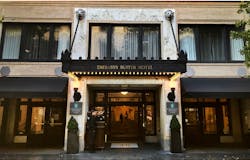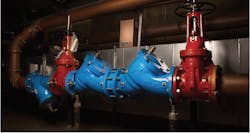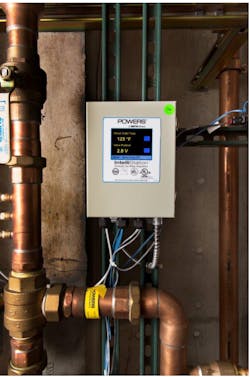Digital Mix Keeps Historic Hotel in Hot Water
By BRUCE FATHERS, Watts Water Technologies, North Andover MA
Before staying at a hotel, a friend of mine always checks online guest reviews. They tend to be frank. I can imagine that some hotel managers rejoice (or cringe) at the honesty.
So, before visiting the Embassy Suites in Portland Oregon for the first time, I decided to do some online sleuthwork of my own. The hotel received 4.5 stars out of five. That’s a good sign. I was then surprised to find thousands of hotel reviews from guests, most of which gave an enthusiastic thumbs-up for the 276-room historic hotel, an architectural masterpiece built in 1912.
As I scrolled through the reviews, page after page of them, one caught my eye. A man and his wife, while traveling, had stayed there for at least one night. In the review, he wrote that he had two pet peeves: lack of hot water and an uncomfortable bed. (NOTE: My bed at Embassy Suites passed with flying colors.)
According to his review, he was once told by a hotel operator at another hotel that “technical problems” made it impossible for him take a warm shower for an hour or more. He went on to say that downtown Portland’s Embassy Suites provided hot water fast, and plentifully. He rated them 5 of 5 stars.
My interest was more than mere curiosity. I would soon visit the hotel located in downtown Portland. That’s why I was especially intrigued to see that the guest went on to say that the hot water that he gave them a rave review for was connected to my reason for visiting the hotel.
A year ago, hotel managers smartly decided to install a digital mixing station for their domestic water system. I was there to see the new technology installed and to find out if hotel managers were pleased with its performance. Of course, I already knew that at least one guest rated it at five stars.
Why Water Temp Is a Big Deal
The issue of hot water clearly was important to the guest who posted his pet peeves for all to see. And it was important to me because my visit to the hotel was to experience the marvel of near-instantaneous hot water so that I could write this article.
For many years, according to the hotel’s chief engineer, Phil Cox, domestic water was heated in three, 1,500-gallon tanks through copper tube bundles that exchanged BTUs from two steam boilers. No thermostatic mixing was involved.
“Heat was moved directly over from the boilers, on priority, into the big steam bundles to meet hot water demand by room guests,” explained Cox. “This was the way guest room, kitchen, laundry, janitorial and guest room water was heated for 20-some years.”
But the system was not perfect. “We realized that there were potential problems in addition to the temperature swings that guests experienced occasionally,” he added. “We weren’t comfortable with that inconsistency, even though we were fairly successful at maintaining 120 to 125°F water temps leaving the tanks.”
There was also the potential of microbial growth in the tanks if storage temps went too low, Cox noted. “If we stored water at higher temps to eliminate the risk of microbes in the big storage tanks, we created the risk of too-high water temperatures at points of use – sinks and showerheads,” he explained.
At that time, news of digital mixing technology – ideal for hospitals, nursing homes and casinos, for instance – was available, and well-suited to hotel retrofits, too.
“Considering the routine maintenance and ongoing challenge of constantly fine-tuning our efforts to keep guests comfortable – and it was no small challenge, given the lack of precise control of storage temperatures – we made a proactive decision to eliminate all problems with one solution – digital mixing,” Cox added.
Sales engineer Luke Erickson with Seattle-based manufacturer’s rep Stone-Drew/Ashe & Jones and Dan Checri of Powers Controls Solutions, a Watts Water Technologies brand, met with Cox and others at the hotel in January 2017. Three weeks later, all installation preparations had been made.
While visiting the hotel, Erickson also discovered another facet of the challenge at the hotel – not uncommon to commercial properties in Portland (and many other U.S. cities): the challenge of pressure differential.
“The expected or anticipated delivery pressure from the municipal water supply was 80 psi,” explained Erickson. “But the reality was that, several times a day, the delivery pressure dropped to 38 or 40 psi [chiefly during peak use, city-wide] – at times when hotel managers most wanted to maintain proper pressure and temperature settings.”
Substantial pressure fluctuations wreak havoc with any type of domestic water system – especially at hotels where many points of use may be active simultaneously.
Enter Digital Mixing
“We were very fortunate in many ways,” said Cox. “Though we experienced challenges related to temperature consistency, and also had the pressure issues [for municipal water delivery], guests rarely complained. Maybe that’s because they expect that while staying in a grand old hotel.
“But that didn’t deter us from wanting to solve a problem before it grew,” he added. “Our own internal audit confirmed that this was something we needed to do. After all, maintaining the temperature across the entire water system was a maintenance challenge. We also learned that we could handle it with the use of new technology, and with relative ease – regardless of how complex we thought the challenge might be.”
Erickson introduced Cox to the Watts IntelliStation, assuring him that the system was capable not only in managing consistent temperatures throughout the hotel’s entire water system but, by design, responds to municipal pressure fluctuations based on their impact to water temperature change.
“It’s one of the key functions of contemporary digital mixing controls,” said Cox. “They’re equipped with technology that continually monitors temperature, flow, and pressure. The digital controls make constant adjustments [sampling 10/second] based on the differential between mixed outlet temperature and pre-programmed outlet setpoint.”
Simple thermostatic mixing valves can’t do that. Large pressure and temperature swings are difficult to manage, requiring that they be reset routinely, and that systems be re-balanced.
After a careful examination of the capabilities of the Powers IntelliStation digital mixing control, and assessing its fit for the hotel’s water system, Cox called Erickson to say that he’d made his decision to go ahead with the install.
Portland-based Lovett Services won the installation contract. As one of the area’s most experienced commercial/industrial plumbing firms, Lovett was comfortable with the challenge of decommissioning and draining-down an entire, hotel-sized plumbing system.
To avoid down-time to the greatest extent possible, they did as much prefabrication of piping to and from the digital mixing station as possible – both at the shop, and on-site. They worked with Cox and hotel managers to complete the installation, beginning with a lengthy drain-down, in the middle of the night.
Dave Benson, Lovett’s commercial division manager, and a technician, were able to install the IntelliStation within about four hours’ time. “This was our first experience with this product, though we’ve had plenty of experience with Powers technology previously,” he said. “The IntelliStation went right to work. Shortly after we completed the supply and return connections, the system did an awesome job of controlling water temperature to all points of use in the hotel.”
Now, storage temperatures are set at 150°F, and supply temps are consistently delivered at 125°F, plus or minus 2°F. “Having that level of consistency within a big, old hotel is a real accomplishment,” added Benson.
The Powers IntelliStation touchscreen control operates a simple three-way valve through a high-speed actuator to precisely maintain the selected outlet temperature. Temperature and pressure sensors are included at key points within the panel to enable an immediate response to changes in fixture demand and supply water conditions. A built-in pump (optional) provides recirculation of the tempered water loop. This reduces the wait time at point-of-use fixtures and conserves water.
“The technology makes a smart delivery solution for mixing domestic water in a hot water recirculation loop,” explained Erickson. “Shortly after learning about them from our rep, we installed one at large hotel on the other side of town. There, we exceeded the expectations of facility managers – a strong confirmation that the technology worked well.”
According to Erickson, sizing and specifying a digital mixing station is simple, with key parameters that include overall GPM, load of the building, pipe sizes, height of the structure, number of rooms, and fixtures, and size of utilities such as the laundry and kitchen facilities.
Digital Mixing + Recirculation
Designers of large plumbing systems are now discovering that a digital mixing system is the most effective way to deliver properly mixed water throughout a hot water recirculation loop.
Digital water mixing represents a significant leap in the technology used to control hot water delivery. The approach incorporates a programmable valve or system to quickly process temperature, flow, and pressure data, which is obtained from the hot and cold water inlets, mixed outlet, and sensors on the mixed-water return. High-speed, responsive electronic actuation modulates a simple valve that allows the setpoint to be electronically controlled and maintained.
Digital mixing allows engineers or facility managers to select a desired hot water temperature and to control and monitor the entire water distribution system. For even greater control, these systems can be installed as part of an ASSE-compliant water distribution system, including point-of-use mixing valves at each fixture in the plumbing system. This ensures that hot water storage temperatures can be kept at levels lethal to pathogens, then mixed to safer temperature levels both at points of distribution, and use.
Other key advantages to digital mixing include:
- Supports energy conservation through more efficient water temperature management—and in turn reduces energy costs;
- Integrates with building automation systems to support integrated building management;
- Supports consistent delivery of hot water on demand wherever and whenever it is needed, in accordance with building codes.
Systems are also field-configurable without the need for a laptop or special software. Digital water mixing and recirculation can easily be integrated into a building automation system (BAS) to allow facility managers to remotely monitor and control water temperatures.
Happy Guests, Happy Management
Since the installation of digital mixing technology at the hotel, facility managers have yet to receive a hot water complaint – with hot water arriving at taps and showers quickly and at a safe, consistent temperature.
Rather than experiencing the constant headache of boiler room problems and system troubleshooting, Cox and his staff merely schedule routine maintenance checks on a six-month cycle.
Varying pressures and temperature fluctuations throughout the hotel’s hot water system no longer pose a threat; they’re managed with ease. While 125°F water is sent to guest rooms in an instant, a second hot water loop now runs 150°F water to the kitchen and laundry areas where higher temperatures are needed for cooking and cleaning. And, water is safely generated and stored at a germ-scorching 175°F.
Now, almost a year in with the new digital mixing system, Cox affirms that guests are happy. “And when guests are happy, and especially if they’re offering online reviews with multiple stars, facility engineers, hotel managers and building owners are happy,” he added. “We can’t ask for much more than that.”
Based in Chicago, the author is Product Director and Team Leader for Watts Water Technologies, a 144-year-old global provider of plumbing, heating, and water quality solutions for the commercial, industrial and residential markets.



